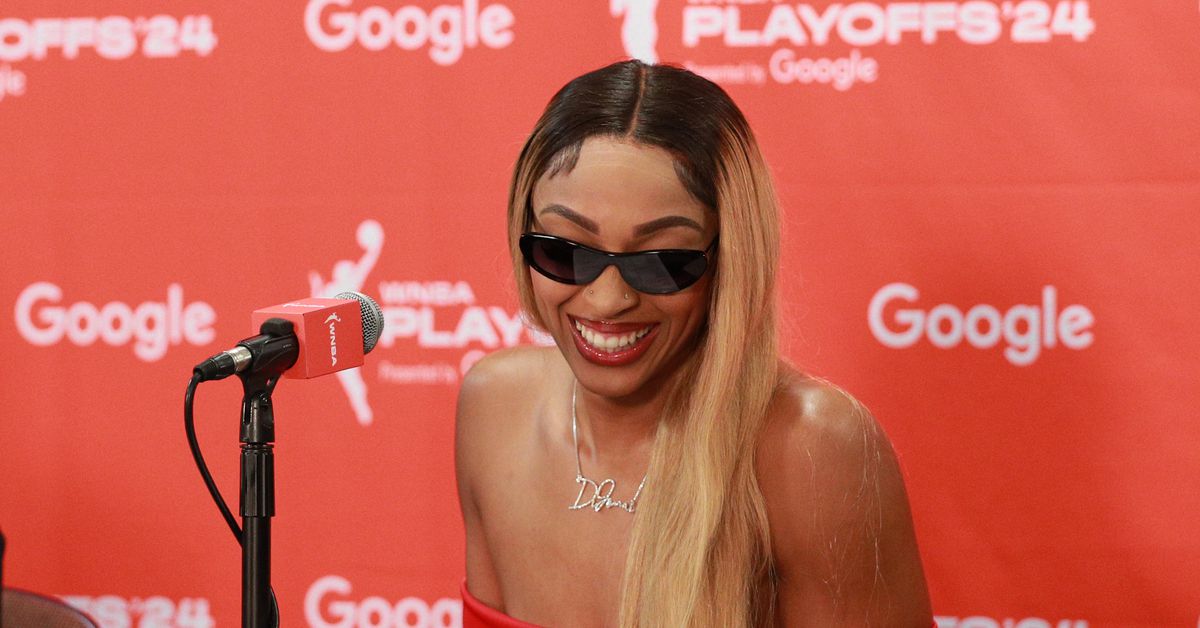
Instead of celebrating the quartet of first-round sweeps, where the likes of A’ja Wilson, Napheesa Collier, Sabrina Ionescu and Alyssa Thomas delivered some all-time performances for their victorious squads, attention wandered elsewhere in the world of women’s basketball this week.
Yes, it’d be nice to just focus on basketball, but, as many of the players who compose the WNBA carry multiple marginalized identities (woman, Black and queer), segments of society have a hard time reckoning with their presence and power, and therefore respond with a reactionary stew of racism, misogyny and homophobia. As Andraya Carter asserted about the WNBA on ESPN on Wednesday night:
It’s also a league that thrives on women that truly take pride in inclusivity, in diversity, and welcoming others and protecting marginalized groups. And so there’s no room for racism. There’s no room for bullying. There’s no room for derogatory comments.
As much as we want this league to grow, we will grow slower if it means leaving those fans out of the mix.
On to the details about the week’s news:
WNBPA calls out Christine Breannan
On Friday, WNBPA Executive Director Terri Jackson released a statement on behalf of the union’s 144 members that called out USA TODAY’s Christine Brennan, taking exception for the questions she posed to the Connecticut Sun’s DiJonai Carrington between Games 1 and 2 of the first-round series between the Sun and Indiana Fever. Brennan’s extended inquiry about an on-court play between Carrington and the Fever’s Caitlin Clark, when Carrington incidentally hit Clark near her eye, was, in the estimation of the WNBPA, “a blatant attempt to bait a professional athlete into participating in a narrative that is false and designed to fuel racist, homophobic, and misogynistic vitriol on social media.”
USA TODAY Sports Executive Editor Roxanna Scott issued a statement in response to the union requesting that the news organization “address what we believe is a violation of several core principles, including seeking and reporting the truth.”
More on the W’s reckoning
After the Sun completed their first-round sweep of the Fever, the racist harassment experienced by players in online spaces, which included a threatening message received by Carrington during the series, dominated the postgame commentary.
Those in attendance at Mohegan Sun Arena also expressed concerns about the in-game atmosphere, suggesting that the behaviors of some fans made others feel unsafe and unwelcome. Journalist Frankie de la Cretaz wrote about their experience for Andscape.
Asked about the need to create a safe environment for the league’s fans, the New York Liberty’s Breanna Stewart, a WNBPA Vice President, shared, “Usually, WNBA games are the place where they can feel comfortable and at home, if you will. So for those fans that weren’t, I’m sorry that they felt that way. As a league, we need to do better.”
Breanna Stewart on creating a safe environment for the WNBA’s fanbase: “Usually, WNBA games are the place where they can feel most comfortable and at home, if you will. So for those fans that weren’t, I’m sorry that they felt that way. As a league, we need to do better.” @Winsidr https://t.co/67t89P4u34
— Myles (@MylesEhrlich) September 27, 2024
During their exit interviews, members of the Fever were asked about the increase in online harassment, as fans who purportedly support their team, in particular, have gained a reputation for injecting toxicity into online conversations.
Caitlin Clark cast those who target players with racist, sexist or homophobic comments as “trolls,” while Kelsey Mitchell and Erica Wheeler emphasized that they do not condone such comments and that derogatory attacks from know-nothing fans should be ignored. Aliyah Boston expressed an understanding of the real, harmful impacts that the “hate spread” online can have on players, as she had to take a break from social media when she was a victim of vile comments during the Fever’s early-season struggles.
After WNBA Commissioner Cathy Engelbert first fumbled an opportunity to speak out against the growth in the online harassment of players during an interview on CNBC, she sent a letter to players that suggested, “I want us as a league to do our part to change the too often toxic and abusive nature of social media discourse.”
It seems like it’s time for the league to go beyond issuing statements and begin to take substantive action.
A salute to Layshia Clarendon
A belated congratulations to Layshia Clarendon for an impactful WNBA career!
It’s hard to carve out a WNBA career across 11 seasons and six teams. Yet, Clarendon did that, establishing an earned reputation as a trusted contributor through their transience. Through their stops in Indiana, Atlanta, Connecticut, New York, Minnesota and Los Angeles, Clarendon not only could be trusted as a steady hand on the court, but also as a shining representative off the court—of their team, the local community and the league. Clarendon always embodied the best of what the WNBA can be, even as some of the teams that employed them seem to take for granted their value.
Sue Bird and Megan Rapinoe give their flowers to Layshia Clarendon, who recently announced their retirement from the WNBA:
“We wouldn’t have gotten the CBA in 2019 done without Lay. And we 100% would not have accomplished, what we accomplished, in the 2020 season – which is… pic.twitter.com/DcQoTYfQzq
— Vanshay Murdock (@VanshayM) September 25, 2024
In openly being themself, Clarendon helped create space for a spectrum of LGBTQ+-identifying persons to see sports as place where they belong. As the above discussions indicate, the WNBA needs icons like Claredon more than ever (even if it should not be the responsibility of those who bear multiple marginalized identities, and therefore are most vulnerable, to help society’s resistant and reactionary sectors progress).







